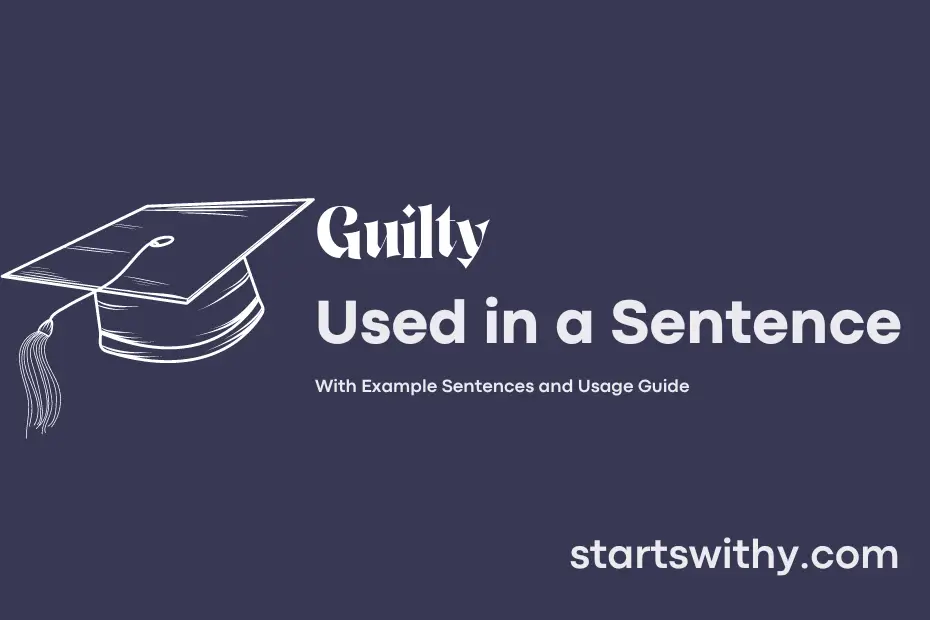Have you ever experienced the feeling of guilt? Guilt is the emotion we feel when we believe we have done something wrong or have failed to meet a certain standard. It can weigh heavily on our conscience and impact our thoughts and behavior.
When someone feels guilty, it can lead to feelings of remorse, self-blame, and a desire to make amends for their actions. Guilt can also serve as a valuable indicator of our moral compass, helping us understand the difference between right and wrong.
7 Examples Of Guilty Used In a Sentence For Kids
- I felt guilty for eating all the chocolates.
- She looked guilty when the teacher asked who broke the vase.
- He was guilty of not sharing his toys with his friends.
- They felt guilty for running in the school corridor.
- The puppy looked guilty after chewing up the shoes.
- She was guilty for drawing on the walls with crayons.
- He felt guilty for forgetting his friend’s birthday.
14 Sentences with Guilty Examples
- Guilty of pulling an all-nighter to study for exams.
- Sometimes I feel guilty for skipping class to hang out with friends.
- As a college student, I have been guilty of procrastinating on assignments.
- Guilty of indulging in street food instead of eating a healthy meal.
- I admit, I am guilty of oversleeping and missing morning lectures.
- Have you ever felt guilty for submitting a group project late?
- It’s easy to feel guilty for spending too much money on online shopping.
- Guilty of using social media during lectures instead of taking notes.
- I have been guilty of copying someone else’s work during an exam.
- It’s common for college students to feel guilty about not exercising regularly.
- Guilty of not studying as much as I should for that important presentation.
- Have you ever felt guilty for not being able to balance academic and social life?
- As a student, I have been guilty of skipping meals due to a busy schedule.
- It’s okay to feel guilty for not attending all the extracurricular activities on campus.
How To Use Guilty in Sentences?
Guilty is an adjective used to describe the feeling or state of being responsible for a wrongdoing. In a sentence, Guilty is often followed by a preposition like “of” or “for.”
Here is an example of how to use Guilty in a sentence:
– He felt guilty for not returning the book to the library on time.
When constructing a sentence using Guilty, it is important to remember the following tips:
– Determine what the person or subject is feeling or being accused of.
– Use the word Guilty to describe that feeling or responsibility.
For instance:
– The defendant was found guilty of robbery.
– She admitted to feeling guilty for missing her friend’s birthday party.
By following these simple tips, you can effectively incorporate Guilty into your sentences to accurately convey a sense of responsibility or remorse. Remember, practice makes perfect, so try incorporating Guilty into your conversations or writing to become more comfortable with its usage.
Conclusion
In conclusion, sentences containing the word “guilty” often describe a person’s acknowledgement or admission of wrongdoing, culpability, or responsibility for a specific act or offense. These sentences are commonly used within legal proceedings, where the determination of guilt or innocence carries significant consequences. Within everyday conversations or written communications, “guilty” can convey feelings of regret, shame, or remorse for actions that have caused harm or transgressed moral or legal boundaries. Whether in a court of law or personal interactions, the word “guilty” carries weight and implies a recognition of fault or misconduct.
Overall, sentences incorporating the word “guilty” serve as a clear and direct way to express accountability or wrongdoing. They provide a straightforward means of acknowledging actions that have strayed from ethical norms or legal standards, eliciting feelings of contrition or acceptance of the consequences that may follow.



